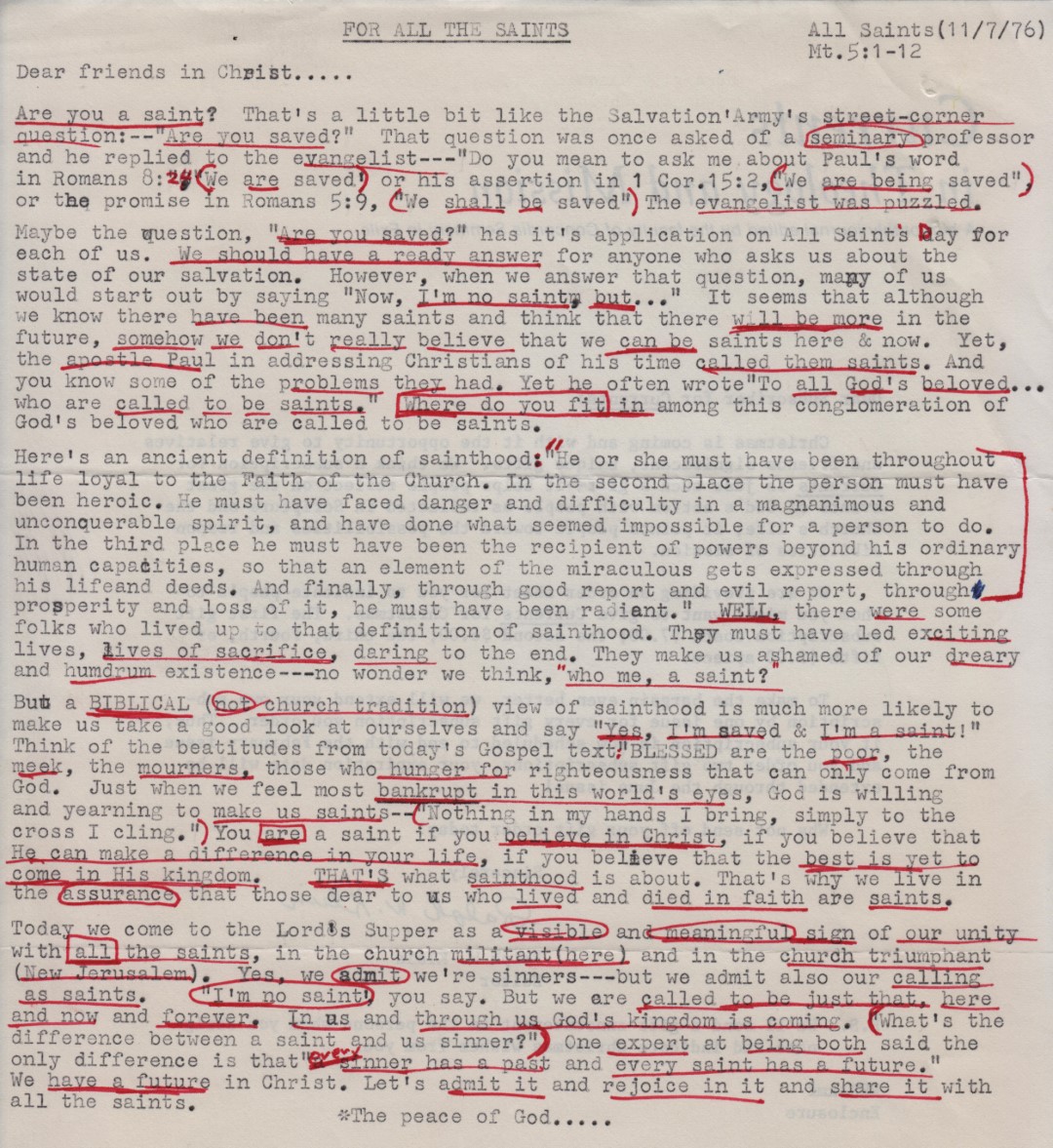This sermon is a typed All Saints Day sermon from 1976, with notes and highlights in red.
I tried to use Google OCR to transcribe this sermon, and that text is below the scanned image. The gospel message is from Matthew 5, which corresponds to the All Saints Day text for Year A in the Revised Common Lectionary. This sermon shares a name with a previously posted sermon from 1988, but the content seems different between the two.
FOR ALL THE SAINTS - All Saints Day - 11/07/1976

Dear friends in Christ….. FOR ALL THE SAINTS All Saints (11/7/76) Mt.5:1-12 Are you a saint? That’s a little bit like the Salvation Army’s street-corner question:–“Are you saved?” That question was once asked of a seminary professor and he replied to the evangelist—“Do you mean to ask me about Paul’s word in Romans 8:2 ‘We are saved’ or his assertion in 1 Cor.15:2, ‘we are being saved’ or the promise in Romans 5:9, ‘We shall be saved’. The evangelist was puzzled. Maybe the question, “Are you saved?” has its application on All Saints Day for each of us. We should have a ready answer for anyone who asks us about the state of our salvation.
However, when we answer that question, many of us would start out by saying “Now, I’m no saint, but… It seems that although we know there have been many saints and think that there will be more in the future, somehow we don’t really believe that we can be saints here & now. Yet, the apostle Paul in addressing Christians of his time called them saints. And you know some of the problems they had. Yet he often wrote “To all God’s beloved. who are called to be saints.” Where do you fit in among this conglomeration of God’s beloved who are called to be saints.
Here’s an ancient definition of sainthood: “He or she must have been throughout life loyal to the Faith of the Church. In the second place the person must have been heroic. He must have faced danger and difficulty in a magnanimous and unconquerable spirit, and have done what seemed impossible for a person to do. In the third place he must have been the recipient of powers beyond his ordinary human capacities, so that an element of the miraculous gets expressed through his life and deeds. And finally, through good report and evil report, through prosperity and loss of it, he must have been radiant.” WELL, there were some folks who lived up to that definition of sainthood. They must have led exciting lives, lives of sacrifice, daring to the end. They make us ashamed of our dreary and humdrum existence—no wonder we think, “who me, a saint?”
But a BIBLICAL (not church tradition) view of sainthood is much more likely to make us take a good look at ourselves and say “Yes, I’m saved & I’m a saint!” Think of the beatitudes from today’s Gospel text! BLESSED are the poor, the meek, the mourners, those who hunger for righteousness that can only come from God. Just when we feel most bankrupt in this world’s eyes, God is willing and yearning to make us saints–Nothing in my hands I bring, simply to the cross I cling.” You are a saint if you believe in Christ, if you believe that He can make a difference in your life, if you believe that the best is yet to come in His kingdom. THAT IS what sainthood is about. That’s why we live in the assurance that those dear to us who lived and died in faith are saints.
Today we come to the Lord’s Supper as a visible and meaningful sign of our unity with all the saints, in the church militant (here) and in the church triumphant (New Jerusalem) Yes, we admit we’re sinners—but we admit also our calling as saints. I’m no saint you say. But we are called to be just that, here and now and forever. In us and through us God’s kingdom is coming. What’s the difference between a saint and us sinner?” One expert at being both said the only difference is that inner has a past and every saint has a future."
We have a future in Christ. Let’s admit it and rejoice in it and share it with all the saints. *The peace of God…..